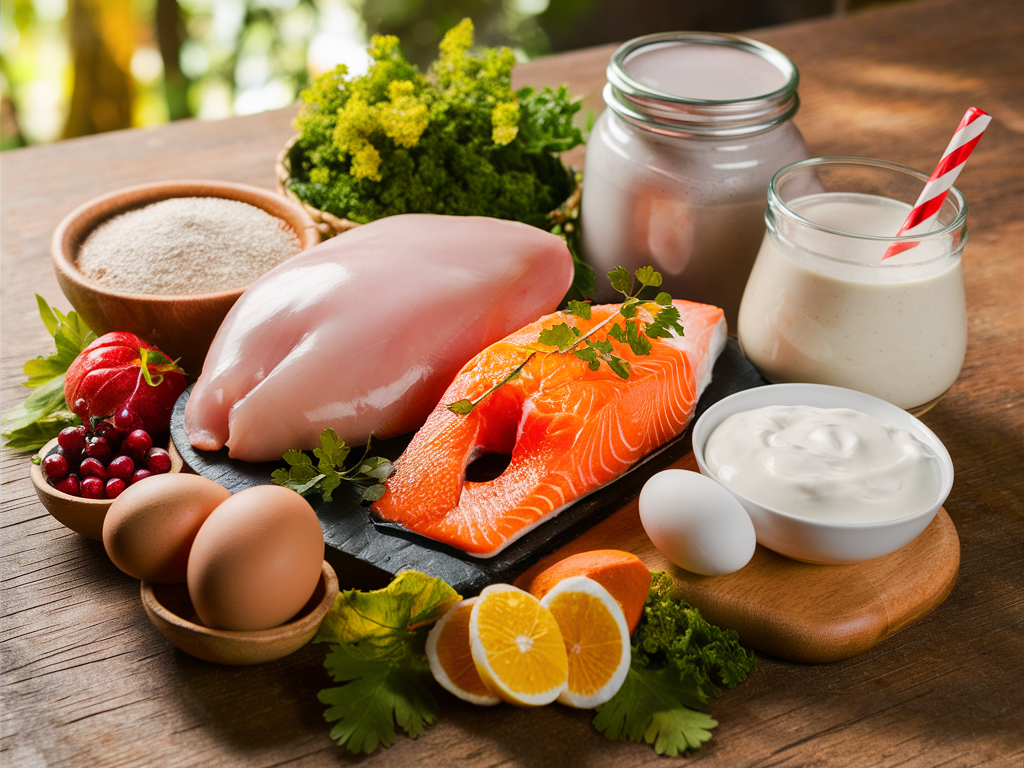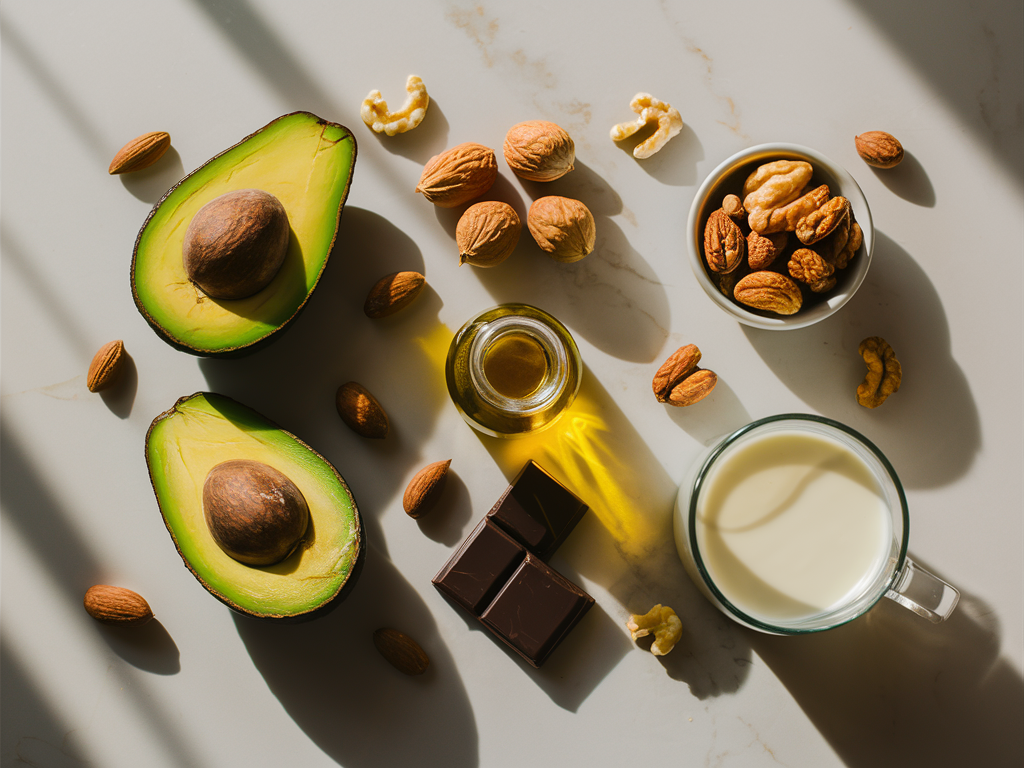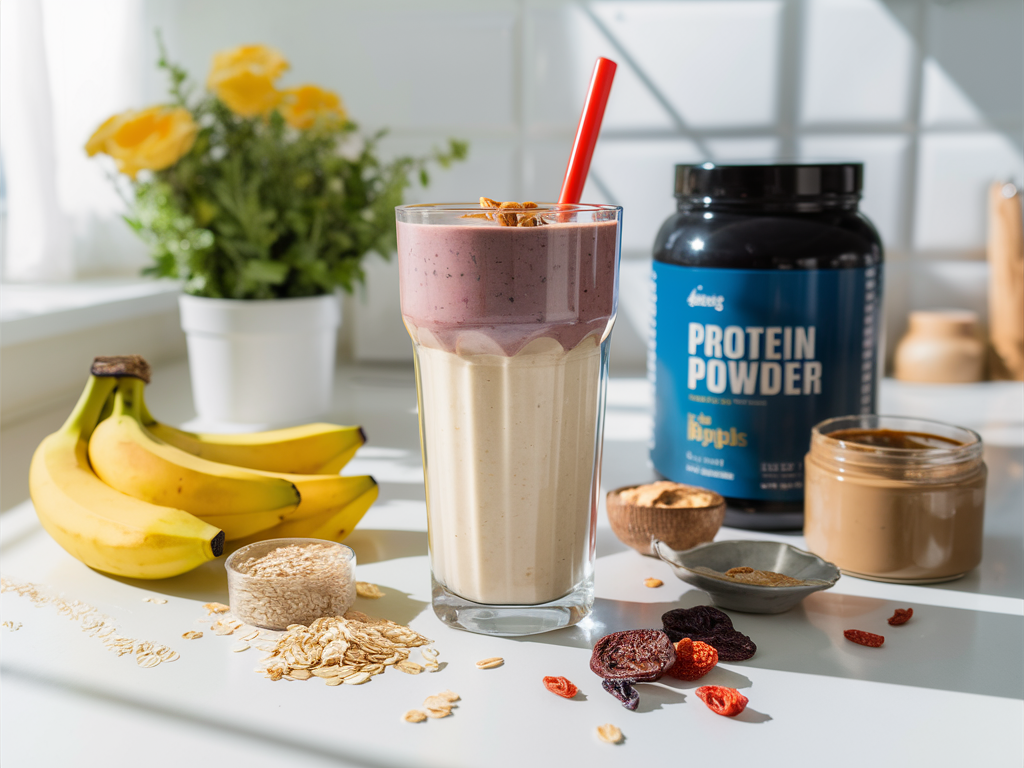Having a healthy body weight is essential for overall wellbeing, but for some individuals, gaining weight can be just as challenging as losing it. While many people struggle with weight loss, those with naturally fast metabolisms or certain health conditions may find it difficult to add healthy pounds. The key difference between simply gaining weight and building quality muscle mass lies in the nutritional approach – one leads to increased body fat, while the other promotes lean tissue development.
Healthy weight gain isn’t about consuming excessive calories from processed foods or unhealthy fats. Instead, it focuses on nutrient-dense options that provide the building blocks for muscle development while supporting overall health. The foods in this comprehensive list offer an optimal balance of proteins, complex carbohydrates, healthy fats, and essential micronutrients that work synergistically to promote muscle growth and healthy weight gain naturally.
High-Protein Foods for Muscle Development
1. Lean Meats
Chicken breast stands as one of the most efficient protein sources for muscle building. With approximately 31 grams of protein per 100g serving, it delivers essential amino acids that directly stimulate muscle protein synthesis – the biological process responsible for muscle growth. At around 165 calories per 100g, chicken breast offers an impressive protein-to-calorie ratio.
For optimal results, consider marinating chicken breasts to enhance flavor and moisture retention. Baking, grilling, or air-frying preserves nutritional integrity while avoiding excessive oils. For those seeking additional calories, thighs and drumsticks provide more fat content while maintaining good protein levels.
2. Salmon and Fatty Fish
Beyond their excellent protein profile (approximately 22-25g per 100g serving), fatty fish varieties like salmon, mackerel, and trout deliver omega-3 fatty acids that support the muscle-building process. These essential fats reduce exercise-induced inflammation, potentially accelerating recovery between training sessions.
The combination of complete proteins and anti-inflammatory omega-3s makes fatty fish particularly valuable for individuals struggling to gain weight, as they support anabolic processes while enhancing overall health markers. Aim for 2-3 servings weekly, preparing through gentle methods like baking or poaching to preserve delicate omega-3 content.
3. Eggs
Few foods match the biological value of egg protein, which contains all nine essential amino acids in near-perfect proportions for human nutrition. A single large egg provides approximately 6-7g of complete protein, with the yolk contributing additional vitamins, minerals, and healthy fats.
The versatility of eggs makes them particularly valuable for weight gain nutrition plans. Whether scrambled, boiled, poached, or incorporated into baked goods, eggs easily integrate into any meal pattern. Research suggests whole eggs stimulate muscle protein synthesis more effectively than egg whites alone, making them an ideal choice for natural muscle building.
4. Greek Yogurt
With double the protein content of regular yogurt (approximately 10g per 100g versus 5g), Greek yogurt delivers concentrated nutrition for muscle development. The straining process that creates its thick texture removes whey, concentrating both protein and calories.
Full-fat varieties provide additional energy from healthy dairy fats, supporting calorie requirements for weight gain. Greek yogurt also contains probiotics that support gut microbiome health, potentially enhancing protein absorption and overall nutritional status – particularly important during higher-calorie eating phases.
Enhance Greek yogurt’s caloric density by adding honey, granola, nuts, or fruit for customizable high-protein meals or snacks that support muscle growth and healthy weight gain.
5. Whey Protein Supplements
While whole foods should form the foundation of any nutrition plan, whey protein supplements offer convenience and efficiency for meeting increased protein needs during muscle-building phases. With rapid absorption characteristics, whey protein quickly delivers amino acids to muscle tissue, making it particularly valuable around workout times.
A standard serving provides 20-25g of high-quality protein with minimal fat and carbohydrates, allowing for flexible integration into various meal patterns. Beyond shakes, whey protein can fortify oatmeal, yogurt, smoothies, or baked goods, increasing their protein content without significantly altering taste or texture.

Carbohydrate-Rich Foods for Energy and Recovery
6. Whole Grain Bread
Unlike refined white bread, whole grain varieties retain the bran and germ, providing fiber, B vitamins, and essential minerals that support energy production during intensive training. With approximately 80-100 calories per slice, whole grain bread offers an efficient way to increase caloric intake.
The complex carbohydrate structure delivers sustained energy release, supporting longer, more productive workouts. For weight gain purposes, dense varieties like pumpernickel or multigrain provide more calories per serving. Pair with protein sources like eggs, tuna, or nut butters to create balanced meals that support muscle recovery and growth.
7. Brown Rice
As a training staple for bodybuilders and athletes, brown rice delivers approximately 350 calories per cooked cup, primarily from complex carbohydrates that fuel intense workouts and replenish muscle glycogen stores. Unlike white rice, the intact bran layer provides fiber and micronutrients that support overall health during calorie-surplus phases.
Brown rice’s mild flavor pairs easily with nearly any protein source, making it highly versatile for meal planning. Create calorie-dense rice bowls by combining with lean proteins, healthy fats from avocado or olive oil, and colorful vegetables for complete nutrition that supports muscle growth and recovery.
8. Oats
With 150-200 calories per half-cup of dry oats, this whole grain provides concentrated nutrition that supports muscle growth and energy production. Oats contain beta-glucans – specialized fibers that support cardiovascular health, particularly beneficial during bulking phases when calorie intake increases.
The versatility of oats makes them particularly valuable for weight gain nutrition. Beyond traditional cooked oatmeal, consider overnight oats, oat-based smoothies, or homemade granola for variety. Adding protein powder, nut butters, dried fruits, or full-fat dairy transforms basic oats into high-calorie, nutrient-dense meals suitable for muscle building.
9. Sweet Potatoes
A medium sweet potato (approximately 150g) provides around 150 calories primarily from complex carbohydrates, along with exceptional micronutrient content including potassium, vitamin A, and various B vitamins that support energy production and recovery. The natural sweetness makes them satisfying without added sugars.
Their moderate glycemic impact, coupled with fiber content, provides sustained energy release ideal for supporting training performance. For weight gain purposes, methods like baking, roasting, or mashing with healthy fats (olive oil, ghee, or coconut oil) increases caloric density while maintaining nutritional integrity.
10. Quinoa
Unique among plant foods, quinoa provides all nine essential amino acids, making it a complete protein source with approximately 8g per cooked cup – unusually high for a grain. This protein content, combined with approximately 220 calories per cup from complex carbohydrates, makes quinoa particularly valuable for plant-based athletes seeking muscle growth.
The mild, nutty flavor adapts well to both sweet and savory preparations. Use as a higher-protein alternative to rice, incorporate into breakfast bowls with fruit and nuts, or add to vegetable-based dishes to increase their nutritional value and calorie content while supporting muscle development.
Healthy Fats for Calorie Density and Hormonal Support
11. Avocados
With approximately 240-320 calories per medium fruit, avocados provide concentrated nutrition primarily from monounsaturated fats that support hormone production – including testosterone and growth hormone essential for muscle development. Unlike many calorie-dense foods, avocados deliver substantial micronutrients including potassium, vitamin K, and various B vitamins.
Their creamy texture makes avocados exceptionally versatile for weight gain nutrition plans. Beyond traditional guacamole, consider adding to smoothies for undetectable healthy fats, using as a spread alternative to mayonnaise, or incorporating into desserts for nutrient-dense calories that support muscle growth.
12. Nuts and Nut Butters
With approximately 160-180 calories per ounce (28g), nuts provide concentrated nutrition from healthy fats, plant proteins, and micronutrients like magnesium and vitamin E that support recovery and overall health. Different varieties offer unique nutritional profiles – walnuts provide omega-3s, almonds offer calcium, and Brazil nuts deliver selenium.
Nut butters concentrate these nutrients further, with approximately 200 calories per two-tablespoon serving. For weight gain purposes, their convenience makes them particularly valuable – add to smoothies, spread on whole grain toast, mix into oatmeal, or use as dips for fruits and vegetables to easily increase meal calorie content while supporting muscle development.

13. Olive Oil
With 120 calories per tablespoon, olive oil provides one of the most efficient ways to increase meal calorie content without significantly altering volume. The monounsaturated fats predominant in olive oil support hormone production and reduce exercise-induced inflammation, potentially enhancing recovery between training sessions.
Beyond salad dressings, consider drizzling over completed dishes, using in marinades, or incorporating into smoothies for undetectable calorie increases. Extra virgin varieties provide additional polyphenols with antioxidant properties that may support overall health during intensive training phases.
14. Full-Fat Dairy
Whole milk provides approximately 150 calories per cup compared to 90 calories in skim varieties, with the additional calories coming from dairy fats that support hormone production. The protein content (approximately 8g per cup) remains consistent regardless of fat content, making full-fat versions more calorie-efficient for weight gain purposes.
Cheese varieties like cheddar provide approximately 115 calories per ounce, along with 7g of complete protein and calcium that supports bone health during resistance training. Incorporate full-fat dairy into smoothies, use as cooking ingredients, or enjoy as convenient high-calorie snacks to support muscle development and weight gain goals.
15. Dark Chocolate
With approximately 600 calories per 100g, dark chocolate (70%+ cacao) provides concentrated energy predominantly from healthy fats and some carbohydrates. Unlike milk chocolate, dark varieties contain significant antioxidants from flavanols that may reduce exercise-induced oxidative stress and support recovery.
The moderate stimulant effect from natural theobromine may support training intensity when consumed pre-workout. For healthy weight gain, dark chocolate offers psychological satisfaction while delivering nutrient-dense calories – incorporate as an occasional treat within an otherwise nutrient-focused diet plan.
Nutrient-Dense Fruits and Vegetables for Micronutrient Support
16. Bananas
With approximately 100-120 calories per medium fruit, bananas provide natural carbohydrates that support energy levels and muscle glycogen replenishment. Their significant potassium content (approximately 450mg per medium fruit) supports muscle function and helps maintain proper electrolyte balance during intensive training sessions.
The natural sugars in bananas make them particularly valuable as pre-workout or immediate post-workout nutrition. Beyond eating fresh, consider adding to oatmeal, incorporating into smoothies, or using in baked goods to increase their calorie content while providing workout-supporting nutrients.
17. Dried Fruits
The dehydration process concentrates both calories and nutrients, with dried fruits providing approximately 3-4 times the calorie density of their fresh counterparts. A quarter-cup of raisins delivers around 120 calories, while the same volume of fresh grapes provides only about 30 calories.
Beyond calorie density, dried fruits offer concentrated sources of minerals including potassium, magnesium, and iron that support exercise performance and recovery. Their convenience makes them particularly valuable for on-the-go nutrition – mix with nuts for balanced snacks, add to oatmeal or yogurt, or incorporate into homemade energy bars for nutrient-dense calorie sources.
18. Coconut
Coconut products offer unique nutritional properties for weight gain. Dried coconut meat provides approximately 350-400 calories per half-cup, predominantly from medium-chain triglycerides (MCTs) that the body can use directly for energy. Coconut milk delivers approximately 450 calories per cup, making it valuable for creating high-calorie smoothies and curries.
The distinct flavor profile adds variety to weight gain nutrition plans. Use coconut milk in smoothies, curries, or overnight oats; incorporate dried coconut into trail mixes or baked goods; or use coconut oil (120 calories per tablespoon) for cooking to increase meal calorie content while providing unique nutritional benefits.
19. Starchy Vegetables
While most vegetables provide minimal calories, starchy varieties offer significantly more energy to support training and recovery. Corn provides approximately 130-150 calories per cup, while green peas deliver around 120 calories per cup – substantially more than non-starchy options like broccoli or spinach.
These starchy vegetables combine higher calorie content with valuable micronutrients and fiber, supporting overall health during weight gain phases. Incorporate into mixed dishes, add to grain bowls, or enjoy as sides with protein sources to create balanced meals that support muscle growth while providing essential vitamins and minerals.
20. Smoothie Ingredients
Creating customized smoothies provides an efficient method for consuming significant calories in liquid form – particularly valuable for individuals with smaller appetites or busy schedules. A basic weight gain smoothie combining banana, oats, protein powder, nut butter, and milk easily provides 500-700 calories with balanced macronutrients.
Additional ingredients like avocado, coconut, yogurt, dried fruits, or honey can further increase calorie content while providing diverse nutrients. The liquid format may reduce satiety signals compared to solid foods, potentially allowing for greater calorie consumption while supporting hydration needs increased by intensive training.

Implementation Strategies for Effective Weight Gain
Successfully incorporating these foods requires strategic planning. Consider this sample meal plan framework:
- Breakfast: Oatmeal made with whole milk, whey protein, banana, and nut butter (approximately 650-700 calories)
- Mid-morning: Greek yogurt with honey, granola, and mixed nuts (approximately 450-500 calories)
- Lunch: Brown rice bowl with grilled chicken, avocado, olive oil dressing, and roasted vegetables (approximately 700-750 calories)
- Pre-workout: Whole grain toast with nut butter and banana (approximately 350-400 calories)
- Post-workout: Whey protein shake with milk, frozen fruit, and oats (approximately 500-550 calories)
- Dinner: Salmon with sweet potato, olive oil-dressed quinoa, and starchy vegetables (approximately 650-700 calories)
- Evening snack: Cottage cheese with nut butter and dark chocolate pieces (approximately 350-400 calories)
This framework provides approximately 3,650-4,000 calories with balanced macronutrients, supporting muscle growth while minimizing excessive fat gain.
For optimal results, increase portion sizes gradually rather than immediately maximizing food volume. This allows digestive capacity to adapt while preventing discomfort. Timing nutrient intake around workouts (particularly protein and carbohydrates) may enhance their utilization for muscle development and recovery.
Track progress through multiple metrics – not just scale weight, but also strength gains, body measurements, and overall energy levels. This comprehensive approach ensures you’re building quality muscle mass rather than simply gaining body fat.
Conclusion
Achieving healthy weight gain requires a strategic approach focused on nutrient-dense foods that provide the building blocks for muscle development. By emphasizing high-quality proteins like chicken, salmon, and eggs; complex carbohydrates from whole grains and starchy vegetables; and healthy fats from avocados, nuts, and olive oil, you can create a nutritional environment that supports muscle synthesis while minimizing fat accumulation.
Remember that effective muscle building requires the combination of proper nutrition with progressive resistance training – the foods outlined provide the raw materials, but exercise supplies the stimulus necessary for muscle development. Focus on consistency with both nutrition and training for sustainable results.
Before making significant changes to your diet or exercise program, particularly if you have existing health conditions or have struggled with weight management, consult with healthcare providers or registered dietitians who can provide personalized guidance. With patience and consistent implementation of these nutritional strategies, you can achieve healthy weight gain that enhances both appearance and functional capacity.

